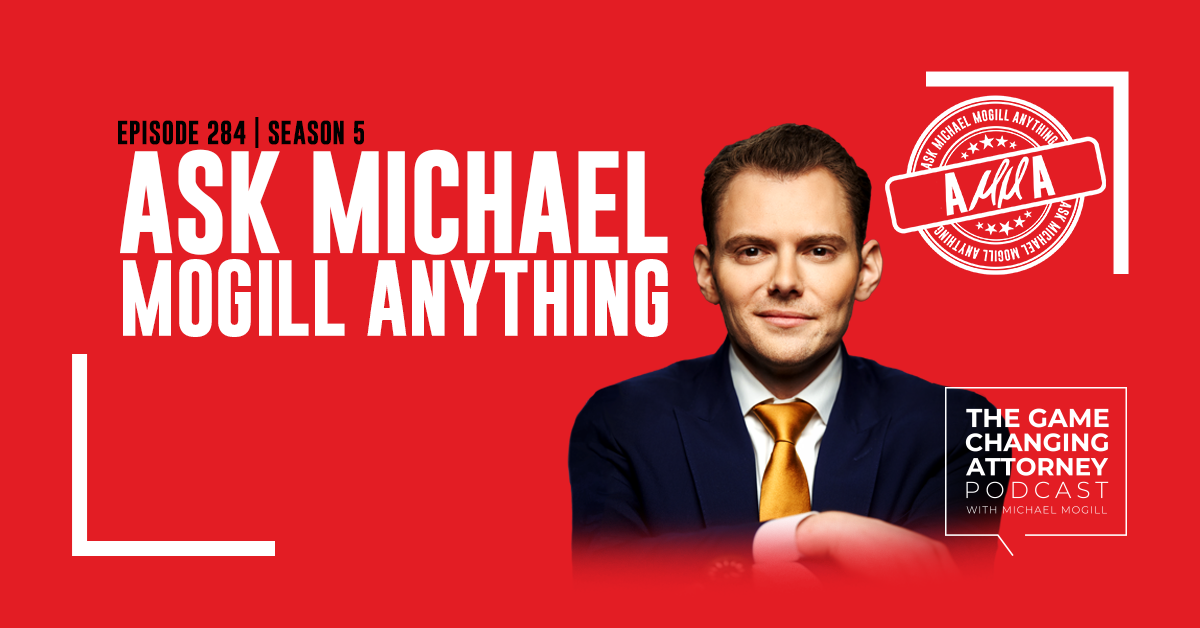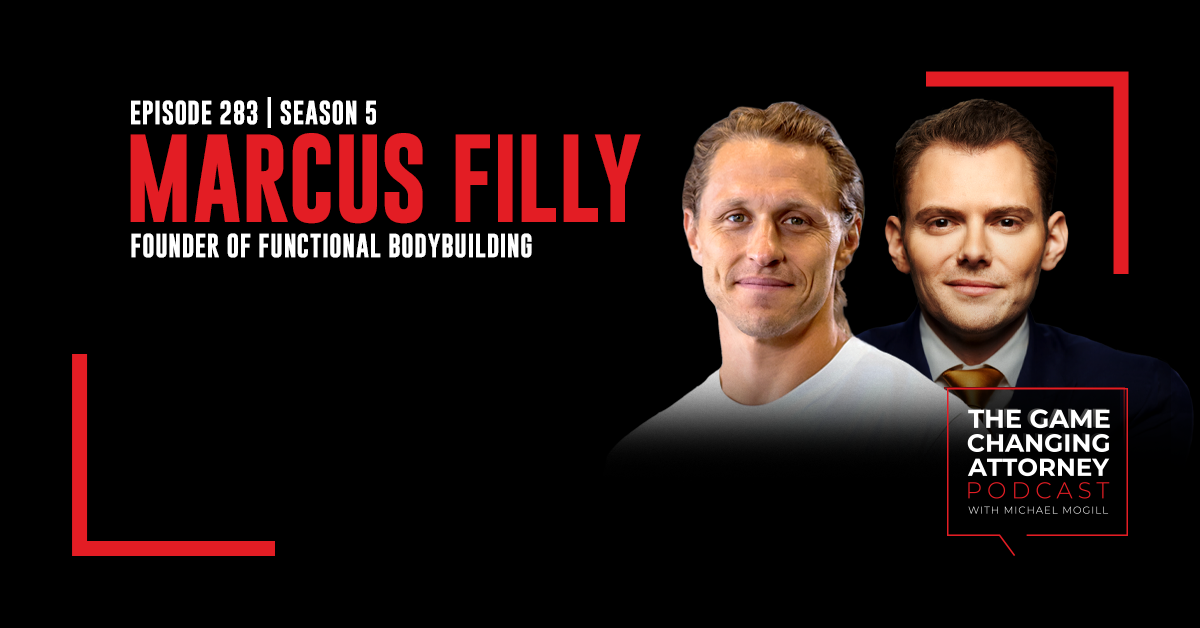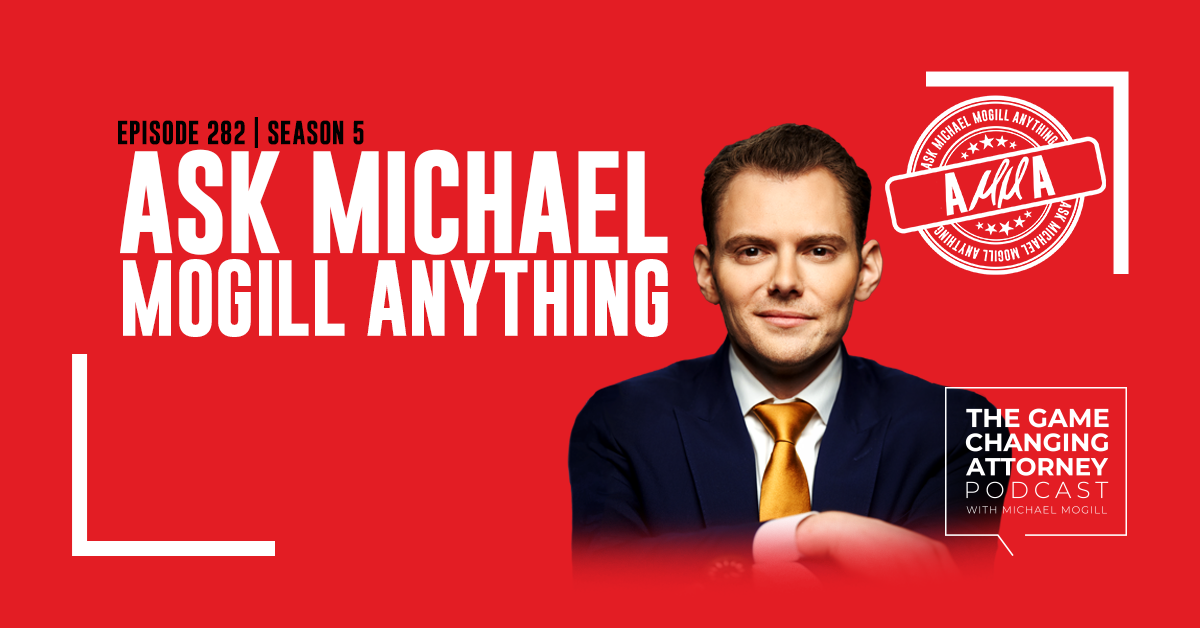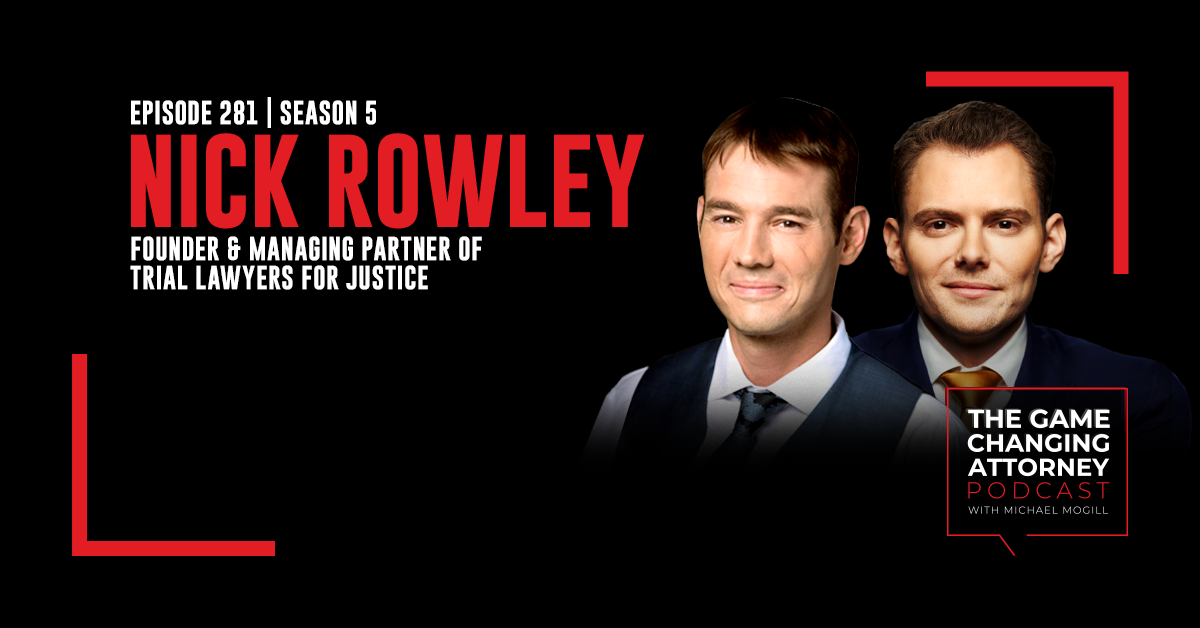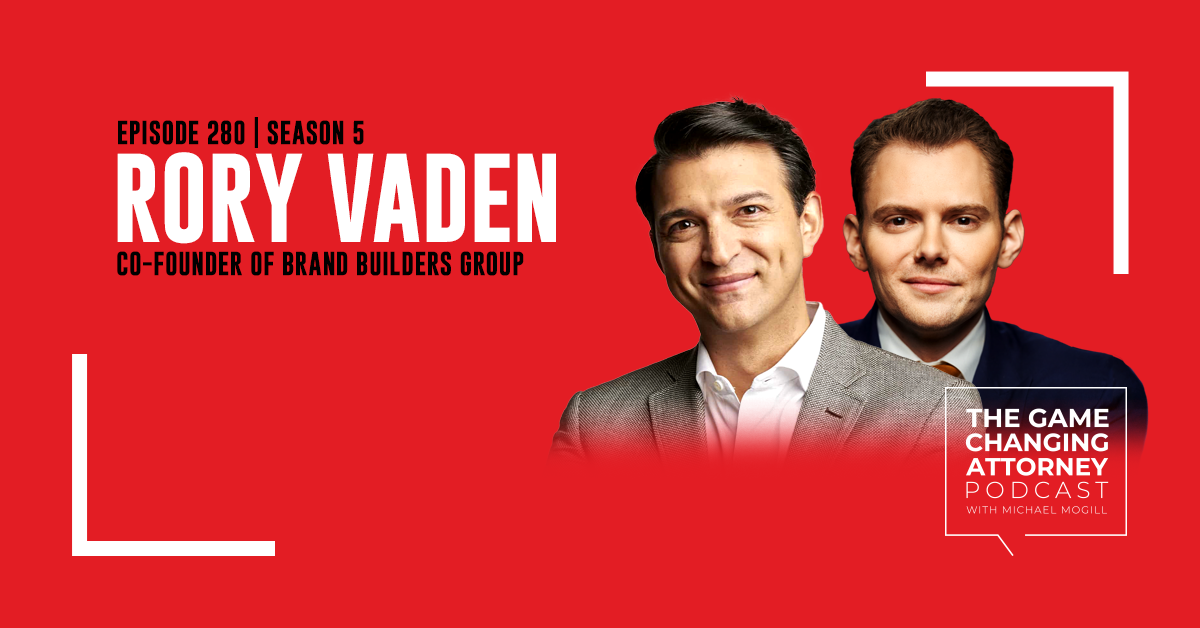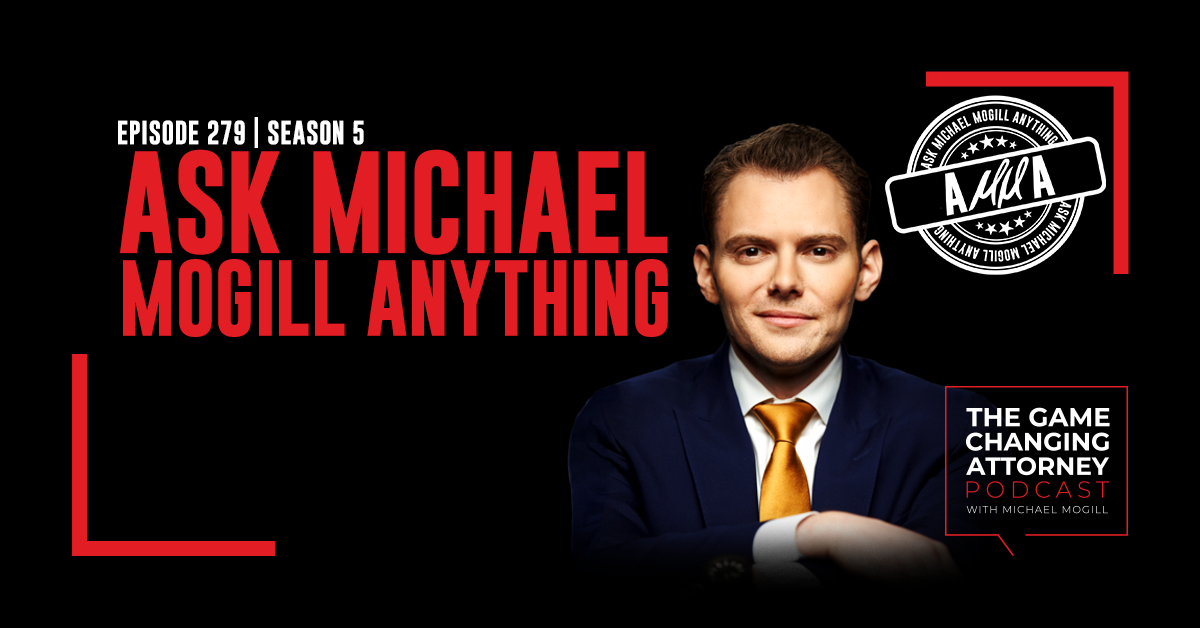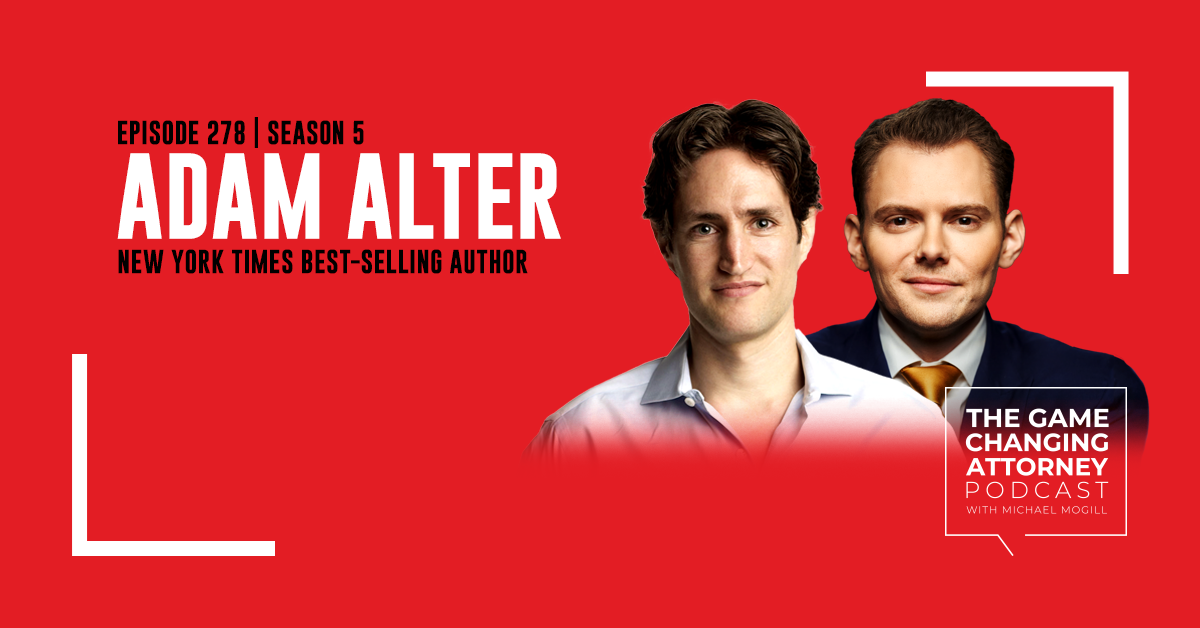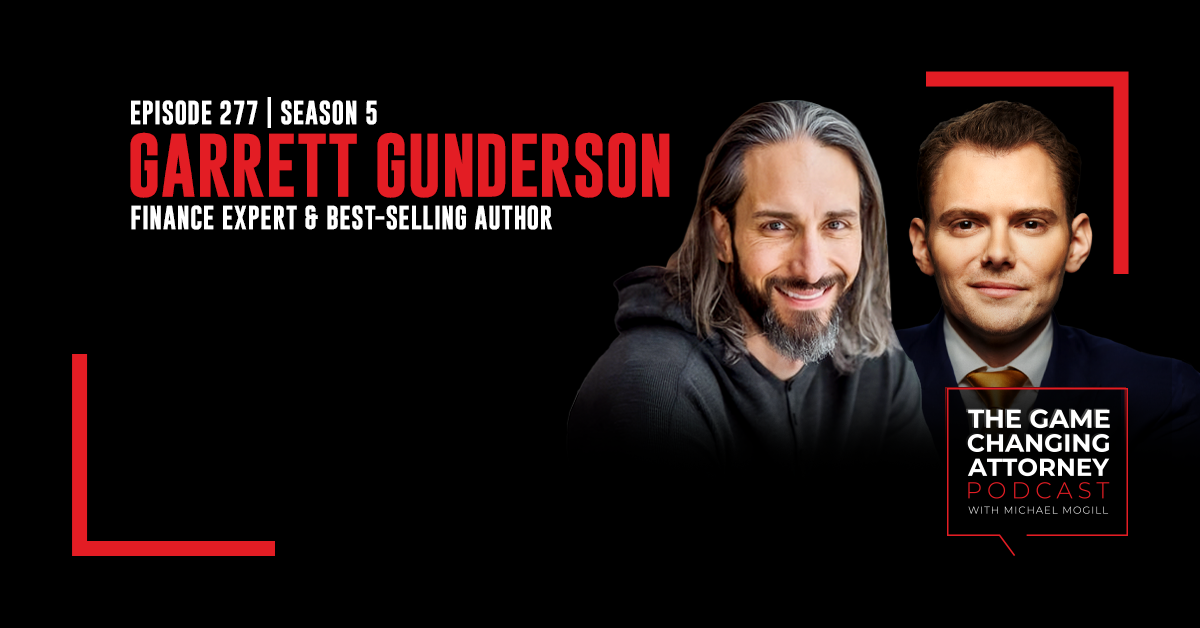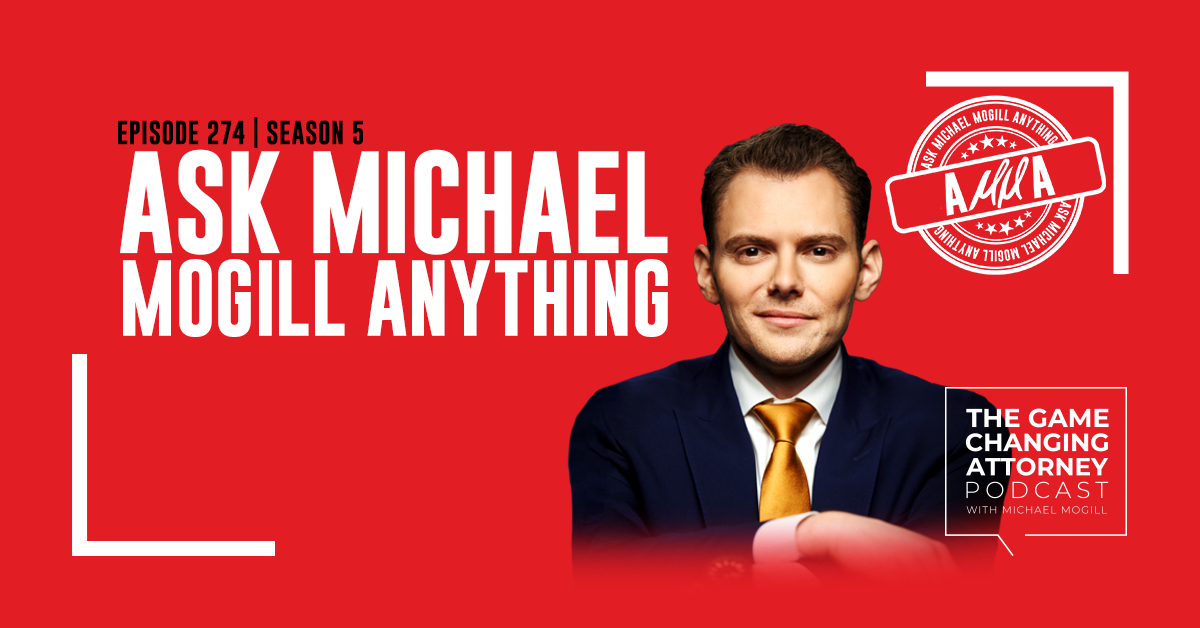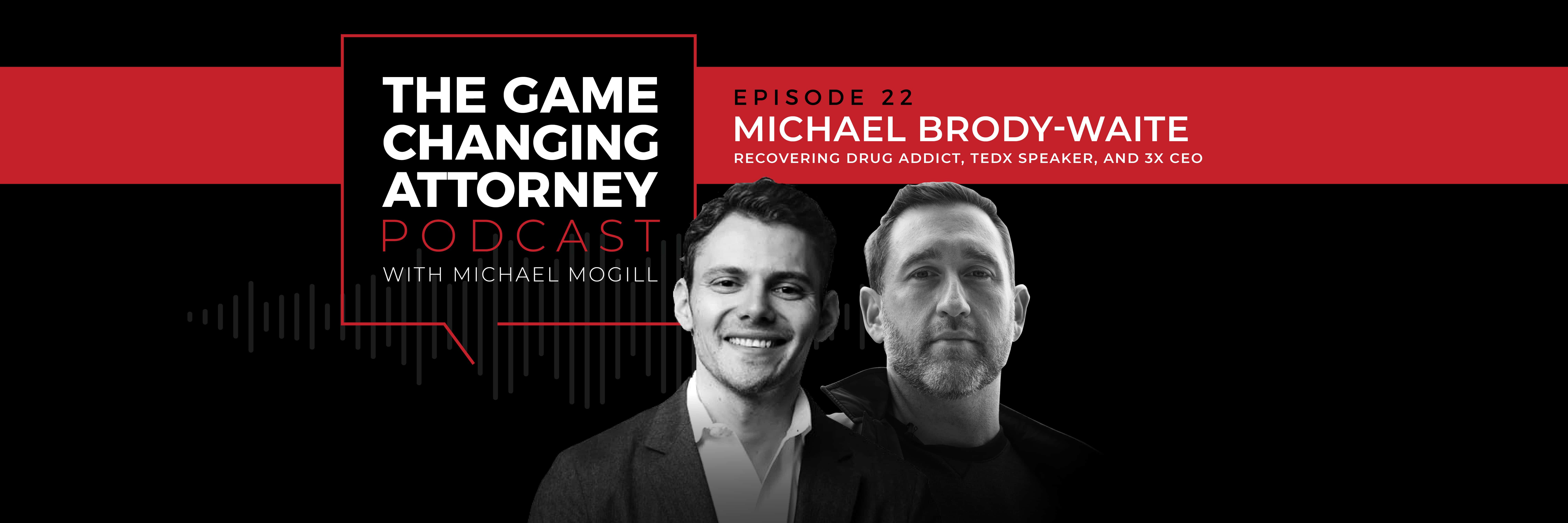
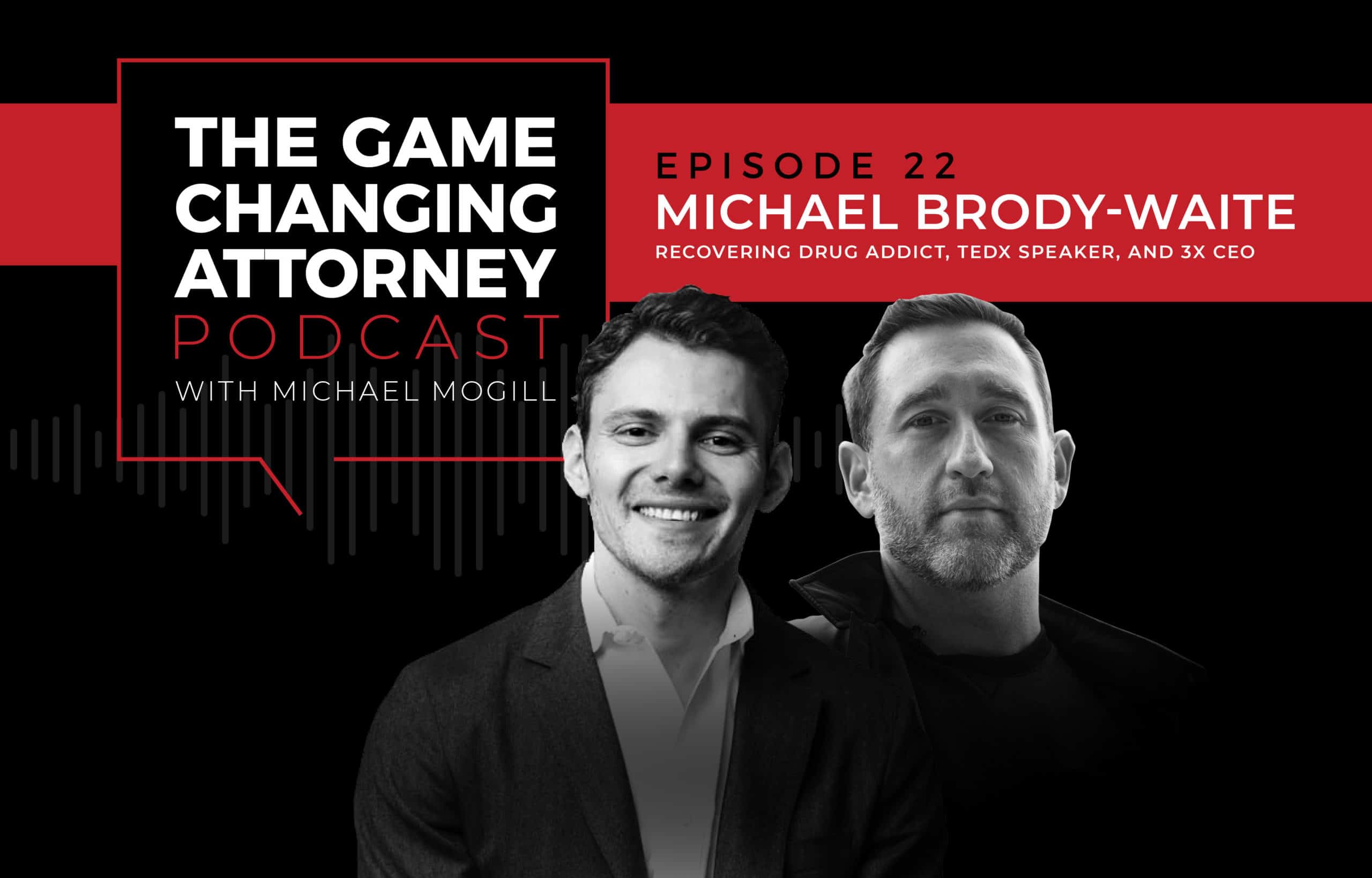
EPISODE 22 — Michael Brody-Waite — Great Leaders Live Like Drug Addicts
Michael Brody-Waite is a recovering drug addict, TEDx speaker whose TED Talk has been viewed over 1.5 million times, and 3x CEO whose companies have earned spots on the Inc. 500 list of fastest-growing companies in America.
This week, Michael joins The Game Changing Attorney Podcast for an inspiring conversation that explores his unique approach to business and life through three key recovery principles:
- rigorous authenticity
- surrendering the outcome
- doing uncomfortable work
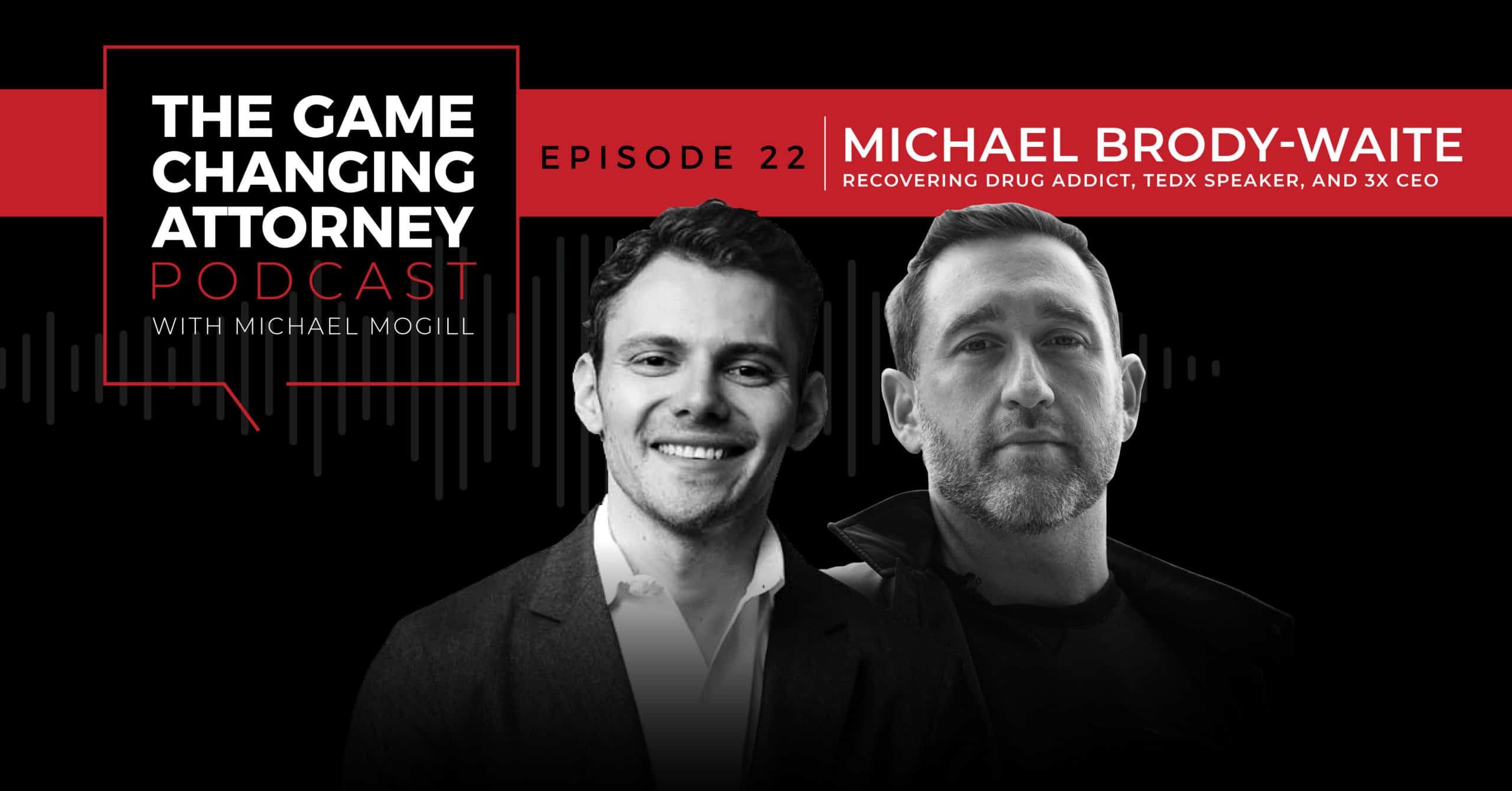
Listen & Subscribe
Show Notes:
1:56 – Business leaders are like drug addicts. “Anytime you call great leaders drug addicts, you’re going to get a taboo response. I think the thing is that when people think of drug addicts, they typically think of people that are shameful to be disappointments — not very effective at leading themselves. And when you think of great leaders, you think of almost the exact opposite. So when you say great leaders are like drug addicts, people are like, ‘What the heck do you mean?’ And usually I mean two different things. The first one is, when I look at addicts in active addiction, they’re doing everything they can to control perception, and the pursuit of the next high. When I look at ‘great leaders’ in our past, I see people that are doing the exact same thing. They’re controlling perception, but just switch out the drug for success. And so they’re not willing to show their true selves. When I look at truly great leaders that are emerging in today and in the future, I see people that are practicing rigorous authenticity. And that is what recovering drug addicts learn how to do, and that is how we end up with a title that makes people go, ‘What the heck are you talking about?’”
3:56 – The origins of addiction. “I started using drugs and alcohol when I went to college. And for me, I started to really struggle with life on life’s terms. I was not comfortable in my own skin. I didn’t know how to deal with the basics. And so I started reaching for the booze, reaching for the drugs. Then I saw this Lifetime movie my freshman year of college about this guy that was a drunk. And I remember thinking, ‘I don’t know how to do this thing called life, but I could probably figure out how to be that,’ and that’s when I really started using alcohol and drugs as a way to completely escape life on life’s terms, and that started leading to all the addiction.”
5:46 – A turning point. “The only thing keeping me from actually living on the street was my buddy’s couch, and I was completely overstaying my welcome. Like, he would go to work and I would steal his booze, steal his drugs, steal his food, invite strangers over, wreck his house. And when I came back and I told him that my dad offered to send me a treatment, he started really encouraging me to do that. I would love to say it’s because he was worried about my health, but I think he was more worried about what a terrible houseguest I had been. But I finally said, ‘Okay, well I’m going to get kicked out of here and I don’t want to live on the street, so I’ll take treatment.’ And I did it not because I was okay with dying; I just didn’t know what to do if I stayed alive. And so I wanted to try it.”
8:57 – Living authentically pays off. “So, the three principles that I was taught were to practice rigorous authenticity, be real at all times, and surrender the outcome, which is really hard to do. And in this case I was terrified about what happened in the job interview and doing uncomfortable work which led to me being in the manager’s office telling him that I was a recovering addict. Even though I knew it meant I wouldn’t get the job — and I mean, even if you’re not an addict, nobody wants to tell somebody in a job interview the worst thing about them. But he gave me the job, and that was like the first time that I had to test this new way of life, and it didn’t mess me up. Like, I was okay. And so, if you look at the rest of my career, I started to realize that not only did me practicing the principles that I learned in recovery and sharing that I’m an addict not hurt me, but I then went on to work in corporate America where I learned that they created a competitive advantage. And so I took that competitive advantage and I founded my own company, and then I created an entire culture and organization of people that were acting essentially like addicts and recovery, and we obliterated our competition, even though they were better funded and had better patents and all that kind of stuff.”
13:13 – The four masks leaders wear. “These three principles allow you to take these masks off at work and reclaim 500 hours a year. The first mask is saying yes when you could say no. The second one is hiding a weakness. The third one is avoiding difficult conversations. The fourth one is holding back your unique perspective. Together these four masks hold back everyone. And the three principles that I learned as a recovering addict were all about learning how to take masks off, and that’s why recovering addicts are the best talent, in my opinion, for leadership.”
15:28 – Don’t be afraid to ask for help. “Everywhere, leaders are scared that if they admit that they don’t have their stuff together — if they’re not perfect — that people are going to disrespect them, but actually what’s worthy of disrespect is when you don’t lead yourself and own your weakness, aggressively share it so you can get a solution, and then actually scale yourself.”
21:24 – Uncomfortable conversations make us better. “Everybody’s doing this when it comes to different conversations, whether it’s with a significant other, whether it’s with a customer and investor, a board member, a co-worker, performance management negotiations — we’re all doing that. And what we’re really trying to do is avoid a sensation in our body. And so if we can learn how to practice rigorous authenticity, identify that we’re wearing the mask of avoiding difficult conversations, then surrender the outcome, we can do more uncomfortable work. And when we have difficult conversations, it actually makes relationships better. It makes decisions better. It makes us understand better. We feel more connected when we get through that. It’s crazy — all these things are so good for us, but we are so scared of them.”
27:02 – Sharing your unique perspective. “I realized that what I was doing was, I was scared to share my unique perspective that I think people are battling mask addiction. And I was scared of how people would respond to that, and that takes me back to being in corporate America and having my boss’s boss in the room. Everybody’s talking about how we’re going to execute this strategy, and I want to be like, ‘Wait, maybe I’m the only one in the room, but should we even be doing this strategy?’ And so holding back your unique perspective is something that is really hard because we’re not taught to lead. We’re taught to follow. And so, with the boss’s boss in the room, on social media, it’s like, what are people going to say? What is my family going to think? We’re constantly scared that if we stick out we’re not going to be part of that tribe anymore. So we’re trained to conform.”
28:29 – Haters are inevitable. “I had a YouTube video where someone called me a sociopath and I’m like, ‘Good. I just collected my hater. Awesome.’ And for me, it was like, if I’m going to share my unique perspective, I’m going to have haters. I’m going to have people that believe in it. I need to be able to step into that but for most of us, we don’t know how much we’re allowing what other people think suppress our unique perspective, whether it’s in professional life or whether it’s just how you dress and your personal life — it doesn’t matter. It’s just a really hard one, but I think it’s one of the most beautiful ones to overcome because everybody’s got a unique perspective that’s really valuable.”
29:50 – Curate your feedback loop. “Someone in recovery gave me this tip. They said to talk to the five people that you trust the most, and if two to three or four of them are saying the same thing, where there’s smoke, there’s fire. And so to me, it’s about having an intentional feedback loop that is curated. Like, when I was building my company, I had a CEO coach, I had a financial coach, and I had a healthcare coach. I curated that decision. So, I intentionally without fail would go to them with my stuff and ask for their feedback. And it was their voice that would kind of help me overcome the masses that said what I was doing was stupid.”
33:03 – Find your tribe. “For me to be able to find people that have the expertise, combined with the principles — that’s the key. Because you can find someone with expertise, but if they live by a different value system, they’re going to lead you astray. There are a lot of different ways to get to a location that you want to get to, but you want to make sure that you get there in a way that matters to you. And for me, it’s being as authentic as possible, practicing as much surrender as possible, and not being scared of uncomfortable work. And so I needed to have people around me that knew how to do that.”
34:14 – Leading authentically. “As a leader, if you truly want to be authentic, that means that you have to share the things that scare you to death. Simon Sinek says, ‘Leaders go to eat last. Authentic leaders go first.’ You have to be the person that sets the table.”
36:49 – Mask-free leadership. “When you live mask free, you’re actually holding yourself accountable to leading yourself because if you show everybody what you got — like, if I’d gone into my team, and every week said, ‘I don’t know how to be a CEO,’ after a year they would have been gone, but because I did that and then I share with them my pros and cons of what I did to scale, that living out in the open holds me accountable to my growth, and also by example shows them how they can lead themselves. I think that’s the best thing a leader can do. We’re so focused on leading others we’ve forgotten how to lead ourselves. Show people how you’re leading yourself.”
39:50 – You’ve only got one shot. “The more important thing is on your effing deathbed, are you going to wish that you had managed everybody’s perception? Are you going to wish that you, with your one shot in life, had been true to yourself and lived life the way you wanted without the exhaustion and the stress of hiding your true self? You’re going to collect more haters, or people that lose confidence. You’re going to collect more advocates. But the most important thing is: When you look in the mirror, do you like what you see?”
40:41 – What does being a game changer mean to you? “Truly great leaders take an unpopular stance, and they change the course of history. I think being a game changer can be anybody that is willing to take an unpopular stance in order to change the world, both for themselves, the people they care about, and everybody that comes after them. Now, we have a lot of visibility and a lot of focus on the people that end up in the history books, but what I would argue is, if you’re a drug addict right now and you get clean, and you change the game for yourself, and then you have a child, and the one thing that you did was model a different way to live for them and you change the game for them, even if that doesn’t end up in the history book — that’s amazing. So being a game changer can be on a large scale or small scale, but it’s about changing yourself. Change in order to change the world so that you can help change one other person’s life.”
EPISODE RESOURCES
Sam Goody
Great Leaders Live Like Drug Addicts by Michael Brody-Waite
Dr. Robert (Bob) Trivers
“70% of employees are avoiding difficult conversations…” Study
The Mask-Free Program
Simon Sinek
Connect with Michael
- Text directly at 404-531-7691
